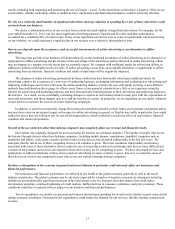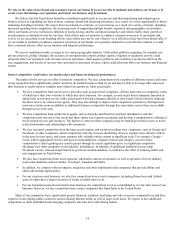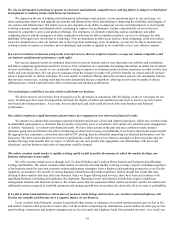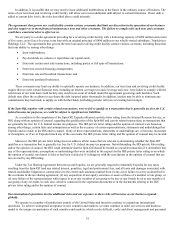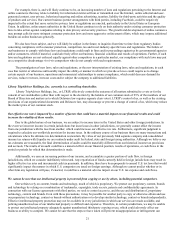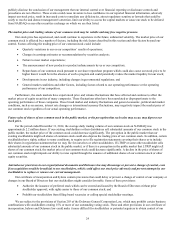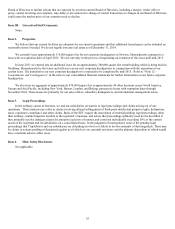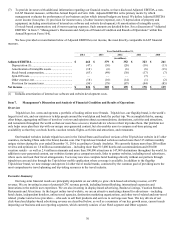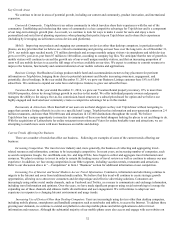TripAdvisor 2014 Annual Report Download - page 32
Download and view the complete annual report
Please find page 32 of the 2014 TripAdvisor annual report below. You can navigate through the pages in the report by either clicking on the pages listed below, or by using the keyword search tool below to find specific information within the annual report.22
intellectual property. Any misappropriation or violation of our rights could have a material adverse effect on our business.
Furthermore, we may need to go to court or other tribunals to enforce our intellectual property rights, to protect our trade secrets or to
determine the validity and scope of the proprietary rights of others. These proceedings might result in substantial costs and diversion
of resources and management attention. Our failure to protect our intellectual property in a cost-effective or effective manner could
have a material adverse effect on our business and ability to protect our technology, content and brands.
We currently license from third parties and incorporate the technologies and content into our websites. As we continue to
introduce new services that incorporate new technologies and content, we may be required to license additional technology, or
content. We cannot be sure that such technology or content will be available on commercially reasonable terms, if at all.
We are subject to foreign exchange risk.
We conduct a significant and growing portion of our business outside the United States. As a result, we face exposure to
movements in currency exchange rates, particularly those related to the Euro, British pound sterling, Singapore dollar, Australian
dollar, and Chinese renminbi. These exposures include, but are not limited to re-measurement gains and losses from changes in the
value of foreign denominated assets and liabilities; translation gains and losses on foreign subsidiary financial results that are
translated into U.S. dollars upon consolidation; and planning risk related to changes in exchange rates between the time we prepare
our annual and quarterly forecasts and when actual results occur.
Depending on the size of the exposures and the relative movements of exchange rates, if we were to choose not to hedge or were
to fail to hedge effectively our exposure, we could experience a material adverse effect on our financial statements and financial
condition. As seen in some recent periods, in the event of severe volatility in exchange rates the impact of these exposures can
increase, and the impact on results of operations can be more pronounced. In addition, the current environment and the increasingly
global nature of our business have made hedging these exposures both more complex and costly. We hedge certain short-term foreign
currency exposures with the purchase of forward exchange contracts. These hedge contracts only help mitigate the impact of changes
in foreign currency rates that occur during the term of the related contract period and carry risks of counter-party failure. There can be
no assurance that our hedges will have their intended effects.
System interruption and the lack of redundancy in some of our internal information systems may harm our business.
We rely on computer systems to deliver content and services. We have experienced and may in the future experience system
interruptions that make some or all of these systems unavailable or prevent us from efficiently providing content and services to users
and third parties. Significant interruptions, outages or delays in internal systems, or systems of third parties that we rely upon, or
deterioration in the performance of any such systems, would impair our ability to process transactions or display content and decrease
the quality of the services we offer to travelers and users. These interruptions could include security intrusions and attacks on our
systems for fraud or service interruption (called “denial of service” or “bot” attacks). If we were to experience frequent or persistent
system failures, our business, reputation, and brand could be harmed.
In addition, our backup systems and disaster recovery, business continuity /or contingency plans for certain critical aspects of
our operations or business processes may not be sufficient. Fire, flood, power loss, telecommunications failure, break-ins, earthquakes,
acts of war or terrorism, acts of God, computer viruses, electronic intrusion attempts from both external and internal sources and
similar events or disruptions may damage or impact or interrupt computer or communications systems or business processes at any
time. Although we have put measures in place to protect certain portions of our facilities and assets, any of these events could cause
system interruption, delays and loss of critical data, and could prevent us from providing content and services to users, travelers and/or
third parties for a significant period of time. Remediation may be costly and we may not have adequate insurance to cover such costs.
Moreover, the costs of enhancing infrastructure to attain improved stability and redundancy may be time consuming and expensive
and may require resources and expertise that are difficult to obtain.
Our processing, storage and use personal information and other data exposes us to risks stemming external and internal security
breaches and failure to comply with governmental regulation, which could give rise to liabilities.
There are numerous laws regarding privacy and the storing, sharing, use, processing, disclosure and protection of personal
information and other consumer data, the scope of which are changing, subject to differing interpretations, and may be inconsistent
between countries or conflict with other rules. We strive to comply with all applicable laws, policies, legal obligations and industry
codes of conduct relating to privacy and data protection. Any failure or perceived failure by us to comply with our privacy policies,
privacy-related obligations to users or other third parties, or privacy-related legal obligations, or any compromise of security that
results in the unauthorized release or transfer of personally identifiable information or other user data, may result in governmental
enforcement actions, litigation or public statements that could harm our reputation and cause our customers and members to lose trust
in us, which could have an adverse effect on our business, brand, market share and results of operations.



